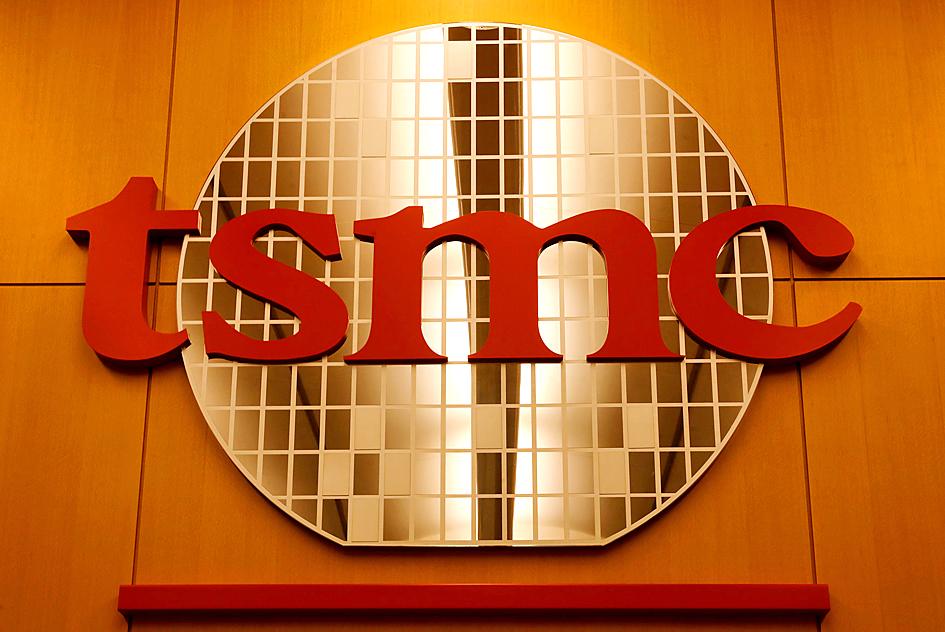Taiwan Semiconductor Manufacturing Co (TSMC, 台積電) reported that the US last year approved 99 percent of its patent applications, which placed the tech giant among the top patent holders in the US.
In its Corporate Social Responsibility Report, TSMC said it last year secured about 3,600 patents worldwide, including more than 2,300 in the US.
As of the end of last year, TSMC owned more than 39,000 patents, the report said.

Photo: Reuters
The company last year filed almost 6,500 patent applications worldwide and ranked among the top 10 patent applicants in the US. In Taiwan, it was the largest patent applicant for the fourth consecutive year.
As of the end of last year, TSMC had filed more than 55,000 patent applications worldwide.
The chipmaker, which has a more than 50 percent share of the world’s pure wafer foundry business, said that to protect its intellectual property, maintain a lead over its peers and boost its competitive edge, it is determined to strengthen its intellectual property portfolio.
Also in the report, TSMC said it last year spent US$2.96 billion on research and development (R&D), a new high in the company’s history.
Last year’s R&D spending rose 4 percent from a year earlier, with its R&D workforce growing 5 percent to 6,534.
The expenses amounted to about 8.5 percent of TSMC’s total sales last year.
The company has said it expects its R&D spending would equal 8.5 percent of its annual revenue until 2030.
TSMC reported record-high sales last year of NT$1.07 trillion, and forecast that sales this year would grow 14 to 19 percent, so its R&D spending is expected to reach another high, ranging between US$3.37 billion and US$3.52 billion.
Analysts said that TSMC’s R&D spending is the reason the chipmaker over the past few years has been able to serve as the sole processor provider to Apple Inc for iPhone production.
Through its R&D efforts, TSMC has also secured large orders from HiSilicon Technologies Co (海思半導體) — an integrated circuit design unit of Chinese telecom equipment supplier Huawei Technologies Co (華為) — and US clients such as Advanced Micro Devices Inc, Nvidia Corp and Qualcomm Inc, as well as Taiwanese IC designer MediaTek Inc (聯發科), analysts said.
Analysts also said that TSMC not only leads South Korean rival Samsung Electronics Co, but has also left its Chinese competitor Semiconductor Manufacturing International Corp (中芯國際) about two generations behind.

TECH CLUSTER: The US company’s new office is in the Shalun Smart Green Energy Science City, a new AI industry base and cybersecurity hub in southern Taiwan US chip designer Advanced Micro Devices Inc (AMD) yesterday launched an office in Tainan’s Gueiren District (歸仁), marking a significant milestone in the development of southern Taiwan’s artificial intelligence (AI) industry, the Tainan City Government said in a statement. AMD Taiwan general manager Vincent Chern (陳民皓) presided over the opening ceremony for the company’s new office at the Shalun Smart Green Energy Science City (沙崙智慧綠能科學城), a new AI industry base and cybersecurity hub in southern Taiwan. Facilities in the new office include an information processing center, and a research and development (R&D) center, the Tainan Economic Development Bureau said. The Ministry

ADVERSARIES: The new list includes 11 entities in China and one in Taiwan, which is a local branch of Chinese cloud computing firm Inspur Group The US added dozens of entities to a trade blacklist on Tuesday, the US Department of Commerce said, in part to disrupt Beijing’s artificial intelligence (AI) and advanced computing capabilities. The action affects 80 entities from countries including China, the United Arab Emirates and Iran, with the commerce department citing their “activities contrary to US national security and foreign policy.” Those added to the “entity list” are restricted from obtaining US items and technologies without government authorization. “We will not allow adversaries to exploit American technology to bolster their own militaries and threaten American lives,” US Secretary of Commerce Howard Lutnick said. The entities

Minister of Finance Chuang Tsui-yun (莊翠雲) yesterday told lawmakers that she “would not speculate,” but a “response plan” has been prepared in case Taiwan is targeted by US President Donald Trump’s reciprocal tariffs, which are to be announced on Wednesday next week. The Trump administration, including US Secretary of the Treasury Scott Bessent, has said that much of the proposed reciprocal tariffs would focus on the 15 countries that have the highest trade surpluses with the US. Bessent has referred to those countries as the “dirty 15,” but has not named them. Last year, Taiwan’s US$73.9 billion trade surplus with the US

The Taipei International Cycle Show (Taipei Cycle) yesterday opened at the Taipei Nangang Exhibition Center, with the event’s organizer expecting a steady recovery in the industry this year following a tough last year. This year, 980 companies from 35 countries are participating in the annual bicycle trade show, showcasing technological breakthroughs and market development trends of the bicycle industry at 3,600 booths, the Taiwan External Trade Development Council (TAITRA, 外貿協會) said in a statement. Under the theme “Ride the Revolution,” the exhibition has attracted more than 3,500 international buyers from 80 countries to preregister for the four-day event, which is expected to